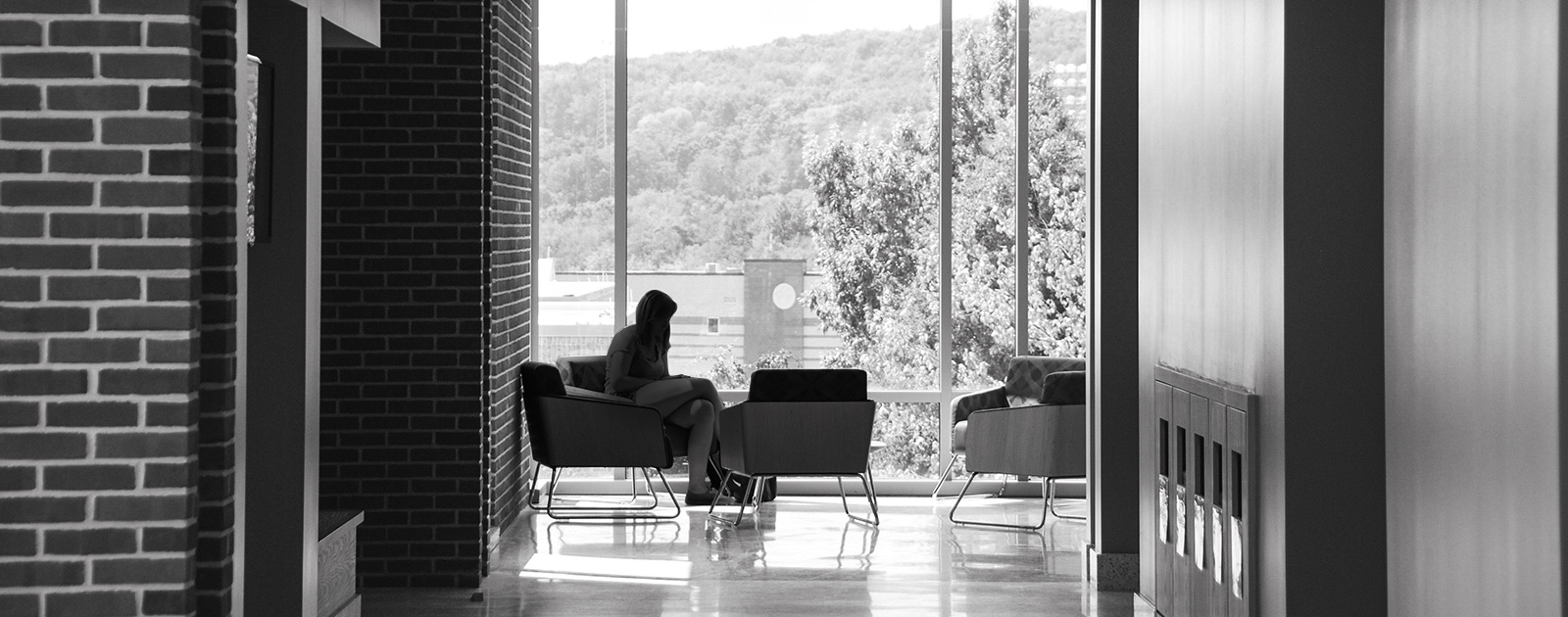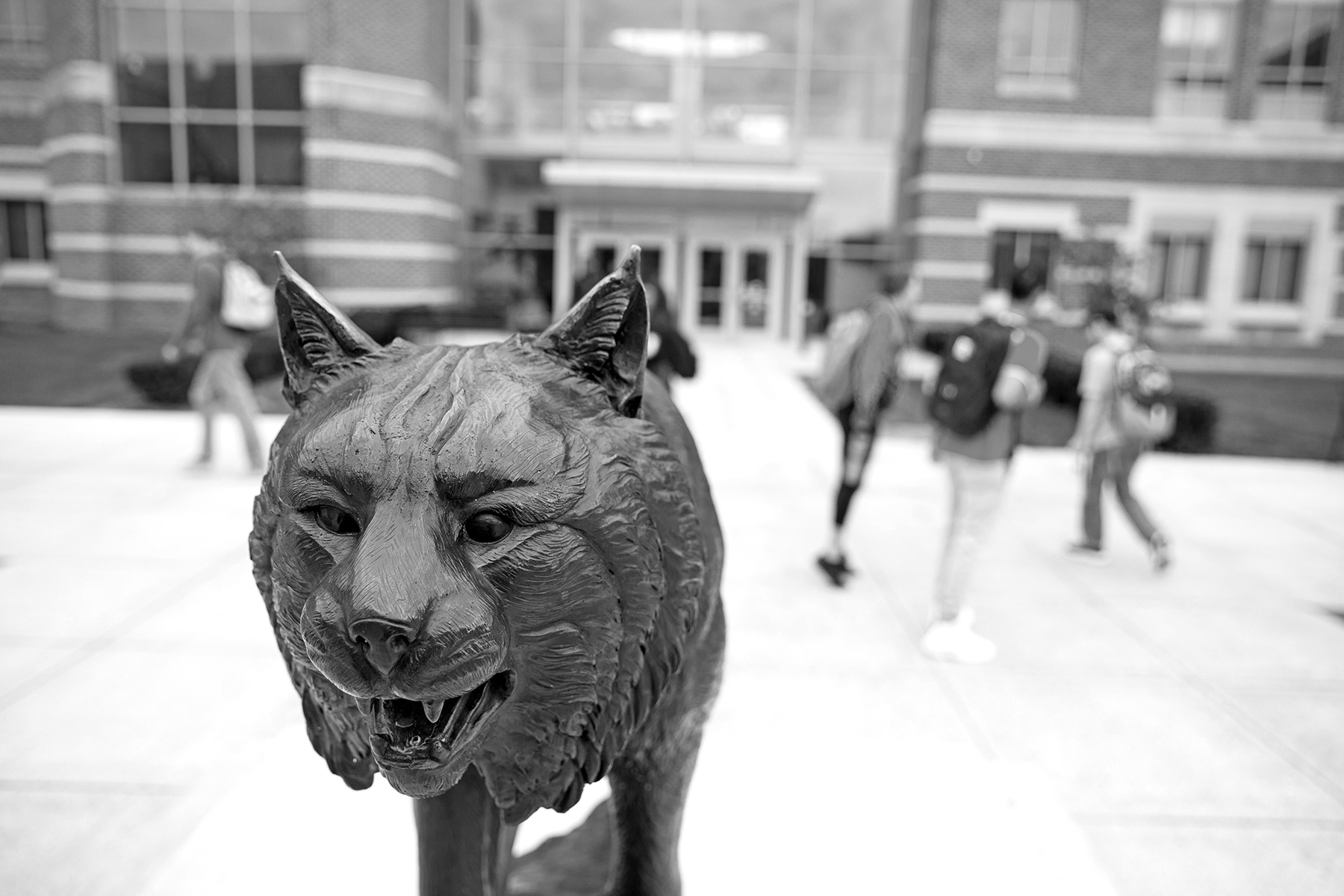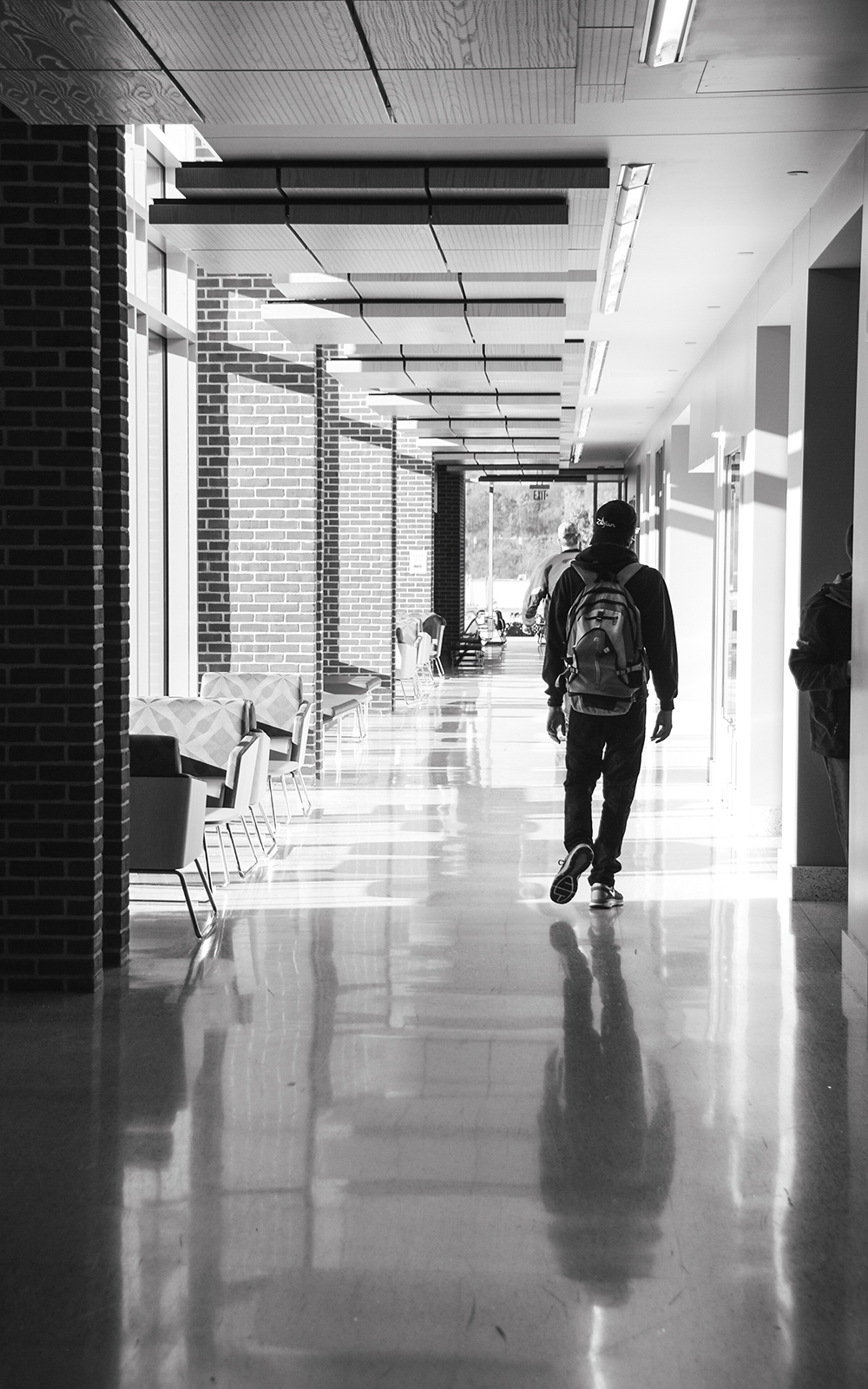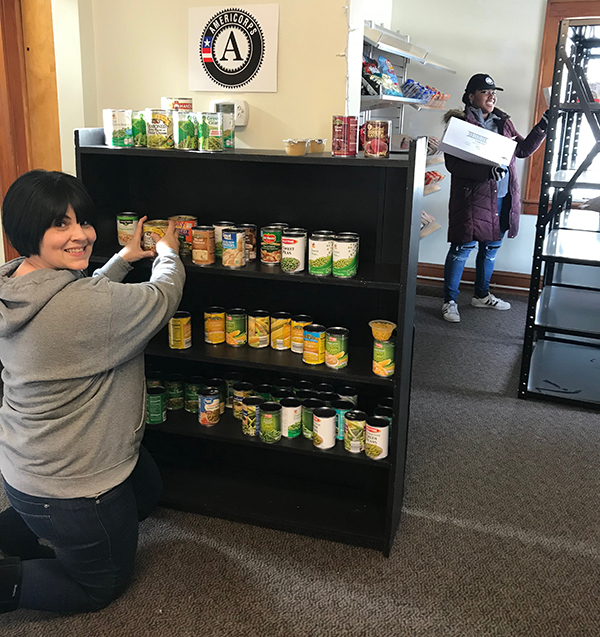FEATURED STORY
The Changing Needs of Frostburg Students
Today's Students Get "Full Service" Education at FSU
BY MIA CROSS M'03

Years ago, parents would load up the family car, drive a distance and drop their children off at college. And once they were there, the college had one job – to educate them. While education is still the priority of institutions of higher education, universities across America have had to adapt to sufficiently meet the total needs of today’s students – including housing and food insecurities, mental wellness and other personal challenges.
And Frostburg is no exception.
“Over the years, we’ve needed to be on top of changing times, to provide more leadership and wrap-around services for our students,” said vice president for Student Affairs at FSU, Dr. Artie Travis. “I always say, if we admit a student, we have to provide services for them.”
Travis, who has been working in higher education for more than 40 years, has witnessed the needs of students drastically change.
“We have really seen an increase in the mental health needs of our students,” said Travis. “Twenty-five years ago, the attention on counseling centers and programs to address mental health was much less significant than it is today.”
According to Travis, mental health needs no longer just mean anxiety or depression from being away from home or taking difficult classes. “These students are coming to us with mental health issues.”
At Frostburg, the Student Counseling Center has expanded over the last few years, in part because of a mutually beneficial partnership formed between the University and UPMC Western Maryland. “Right now, we have five counselors on staff, and since contracting with UPMC, the wait time for students to see a counselor has dropped from two weeks to three days,” said Travis. “We also have a mental health crisis counselor on call so that no student in need has to wait for help.”
 FSU’s University Police are also trained to know when to conduct a mental health evaluation and referral.
FSU’s University Police are also trained to know when to conduct a mental health evaluation and referral.
Health and wellness needs have also continued to evolve over the years. Frostburg has three nurse practitioners and a psychiatric nurse on staff.
“When I first got into Student Affairs more than 40 years ago, health and wellness weren’t as big of a focus as they are today. If you were sick, you went to the infirmary. That was it,” recalled Travis. “Now our Student Health Center staff talks to our students about mental health, eating disorders and other areas of health and wellness important to today’s students.”
Travis also noted that the “changing needs of our student population” is also why Diversity, Equity and Inclusion (DEI) is so important to address all students from all backgrounds. “With Affirmative Action 30 years ago, we only focused on Black and White. DEI today includes so much more.”
Nontraditional students make up a significant portion of the undergraduate populations across campuses, including commuters, part-timers, working or older students, transfers, international students, LGBTQ+ students or those students with disabilities.
Today’s diverse campus populations expose students to a vast array of ideas, lifestyles and forms of self-expression, and colleges need to educate students on how to interact with people from all walks of life and how to understand and respect each other’s personal needs and rights.
According to Travis, FSU is one of the more welcoming campus communities that he has experienced. “We work with the Registrar’s Office to be sure that students are called by their chosen names rather than their given names.”
Challenges surrounding campus engagement are also an issue with today’s college students, and many report feeling disconnected, unsupported or directionless at times. FSU strives to cultivate a sense of belonging through the residential experience, student activities, civic engagement and intramurals and sports.
 In October, FSU launched the Bobcat Passport Program to provide support for cocurricular opportunities for students as a complement to the traditional curriculum. These opportunities help introduce students to culturally diverse thoughts, ideas and expressions to help better prepare them to become engaged global citizens.
In October, FSU launched the Bobcat Passport Program to provide support for cocurricular opportunities for students as a complement to the traditional curriculum. These opportunities help introduce students to culturally diverse thoughts, ideas and expressions to help better prepare them to become engaged global citizens.
“The benefits of the Bobcat Passport Program for students are exposure to a wide range of ideas and viewpoints that will help better prepare them for the workforce and provide them with connectedness in their communities,” said Travis.
Frostburg’s Center for Academic Advising and Retention (CAAR) helps students explore all the curricular and cocurricular opportunities available at FSU, and Student Support Services is available to help low-income students, first-generation college students and students with disabilities achieve academic and personal goals.
FSU offers strong academic advising to give today’s students the guidance they need to identify a career path, select a major and register for courses so they are prepared to be successful after graduation.
In addition to these mental health issues and a bigger focus on health and wellness, today’s students also face issues of food insecurity, financial hardships and even homelessness.
“Food insecurity is a new changing need, I think,” said Travis. “The cost of education continues to increase and so students have less money for basic necessities.”
FSU is home to several first-generation students, many of whom do not have the support at home to help them manage their finances.
“Students make choices, and sometimes when they make bad choices, they end up at our door with no money,” Travis added.
Frostburg’s PAWS Pantry provides food and necessities to FSU students at no cost and aims to decrease the impact that food insecurity has on a student’s academic success. FSU’s Bobcat Career Closet is also available to students at no cost and provides clothing for students who need to prepare for job interviews, internships or even just a life event that requires something more than sweatpants. (See sidebar stories below by clicking here for PAWS Pantry and Career Closet.)
Homelessness among college students was brought to light last semester when an incoming FSU freshman lost his scholarship because of a glitch on his application. Most of this student’s life had been spent couch surfing or living in shelters, and due to his homeless status, he got caught up in bureaucratic red tape. Travis personally traveled downstate to pickup the student and transport him to Mountain Maryland.
 According to Travis, in the past, any time a student approached him with housing insecurity, he was able to get them set up in an unoccupied dorm.
According to Travis, in the past, any time a student approached him with housing insecurity, he was able to get them set up in an unoccupied dorm.
“Now, more and more students either choose to be homeless or are forced to be homeless,” Travis noted.
Once FSU certifies that a student is homeless, the student can receive aid and necessary services and accommodations to help them be successful. On average, Frostburg houses about 10-15 homeless students per year, more than anywhere Travis has worked in the past. He believes it is a sign of the times.
“Students really need financial literacy in high school so that they are better educated when they get here.”
FSU’s Foundation works hard to raise funds for student emergencies. The Student Affairs Crisis Emergency Fund, established after the onset of the pandemic to help students in need, provides financial assistance to students experiencing an immediate financial emergency. Since its inception in March 2020, a total of 125 FSU students have been provided $42,806 in emergency aid.
An Emergency Scholarship fund was established in May 2020, also because of COVID, to assist students encountering financial hardships throughout the year that hinder their abilities to pay for college expenses. A total of 54 FSU students have received $81,360 in emergency scholarship aid.
The FSU Foundation also offers the Forever Frostburg Scholarship for students who encounter special circumstances that hinder their ability to pay for college expenses. Examples of these special circumstances could include the death of a parent or spouse, the loss of income of a parent or spouse, divorce, the loss of federal benefits or unusually high medical expenses. Created in March 2010 as the result of a weakening economy and budget cuts, 110 students to date have received a total of $159,395 in Forever Frostburg Scholarship aid.
According to John Short, vice president for University Advancement and executive director of the FSU Foundation, these three funds were created, and continue to be supported, by generous alumni and other friends of the University.
“We are extremely grateful to those who recognize the emergency situations that some of our students face and want to help,” Short said.
Anyone who wants to help these students can contact the Office of Advancement at 301-687-4068 or visit the giving page on the FSU website at https://www.frostburg.edu/foundation/. Every gift, no matter the size, will help a student in need.
While colleges today still need to nurture cognitive development of their students, experts say they also need to promote physical, social, emotional, personal and ethical growth. Frostburg is adapting to those changes on a “full-service” scale.
FSU PAWS Pantry Celebrates Five Years of Feeding Students
BY CALEB TAYLOR
For the past five years, PAWS Pantry has been serving the needs of the FSU community. The pantry offers a place for students who face food insecurity to receive nutritious food items to help sustain them during their time at Frostburg.
Established with the goal of eliminating hunger on campus, this initiative exemplifies the University’s commitment to the holistic development of its students. According to PAWS Pantry coordinator Kristina Thompson '23, food insecurity is prevalent across college campuses nationwide.
“Not every student can afford a meal plan so finding ways to eat can be difficult for some students,” Thompson said. “Nationwide, food insecurity is very common as well. According to a Feeding America article, about 49 million Americans utilized food assistance programs in 2022 to help with obtaining food for themselves and their families.”

Hunger can significantly hinder academic success. The pantry strives to remove this obstacle and operates on the principles of dignity and respect, recognizing that individuals facing food insecurity may hesitate to seek assistance. By maintaining a discreet environment, PAWS Pantry strives to serve students without fear of stigma.
Despite being in existence for five years, Thompson said there are still many at FSU who do not know of this campus resource.
“Only about 10 percent of the student population has utilized the pantry over the past five years.”
The types of visitors to PAWS Pantry include on- and off-campus students and their food requests change. Common requests are for ramen noodles, frozen fruits, vegetables, white and brown rice and pasta, chips, cookies and pretzels. .
“Different drinks are popular as well, like water bottles, Gatorade, juice boxes and shelf-stable milk,” Thompson said. A list of needed items can be found on the PAWS Pantry web page “We encourage people who want to donate to look there and pick what they please. … Just imagine how a college student would eat.”
To help alleviate food insecurity for FSU students, you can donate non-perishable food items to the pantry located on Braddock Road in Frostburg. Also, monetary donations are accepted through the FSU Foundation for the pantry’s Winter Food Drive. Visit https://give.frostburg.edu/winter-paws-pantry-drive.
Bobcat Career Closet Helps Students Dress for Success
BY TY DEMARTINO '90
In this digital age of electronic resumes and remote working, one thing remains constant – the perfect outfit for the dreaded face-to-face job interview.
When the staff at FSU’s Career and Professional Development Center realized that some students did not have (or could not afford) appropriate clothing for internship and job interviews, they decided to create the Bobcat Career Closet. The space, located in the center’s office in Pullen Hall, houses suits, shirts, ties, skirts, jackets and other items to allow students to look their professional best.
“There were no clothing resources at FSU, so we tried to fill a gap for our students,” said Amy Shimko '94/M'20, director of the Career and Professional Development Center. “It’s important for our students to feel confident in their appearance when they are showcasing their skills and knowledge to employers. We are here to help them do that.”
 According to Shimko, students can browse the Bobcat Career Closet not only for interviews, but all professional events, including career fairs, internships, first day of the jobs and conferences. All clothing items have been donated by FSU faculty, staff, alumni and community members. There is no charge for any student with a valid FSU ID.
According to Shimko, students can browse the Bobcat Career Closet not only for interviews, but all professional events, including career fairs, internships, first day of the jobs and conferences. All clothing items have been donated by FSU faculty, staff, alumni and community members. There is no charge for any student with a valid FSU ID.
“Students are permitted to take whatever items they need and keep them as their own,” Shimko said.
The Closet will officially open for business this spring and Shimko is confident that the need and popularity of this resource will grow.
“The few students we have been able to assist, so far, have been very grateful and appreciative,” she said.
To make a donation of new or nearly new professional clothing items to the FSU Career Closet (skirts, pants, blazers, suits, ties, dresses, blouses and dress shirts), contact the Career and Professional Development Center at 301-687-4403 or careerservices@frostburg.edu.
Student Support Services Celebrates 50 Years
BY TY DEMARTINO '90
For 50 years, Student Support Services, a federal TRIO and educational support program that helps low-income students, first-generation college students and students with disabilities achieve their academic and personal goals, has been a resource on the FSU campus.
“It's an honor to be able to celebrate 50 years of SSS,” said FSU director of TRIO/SSS Holly Clark. “I have only been here for the past 11 of those years, but I can tell that my predecessors worked hard to shape the program into what it is today. They genuinely cared about students and made program decisions based on what was in the best interest of students. The students today benefit from the years of hard work that went into developing the SSS program into the highly respected and successful program that it is today.”
SSS acts as an advocate for qualified students, plans and coordinates services and provides programs that help students develop the academic, interpersonal and social skills they need for success at Frostburg. These services include professional tutoring, academic advising, advocacy and monitoring, career/graduate school guidance, financial/economic literacy services, study skills/time management, student financial aid assistance, personal counseling and educational/cultural enrichment activities.
At an event marking the 50th anniversary at FSU, Clark shared the following comments:
Fifty years ago, on Aug. 24, 1973, Frostburg State College was awarded its first TRIO Student Support Services grant. For half a century now, staff at FSU have been carrying out the TRIO mission of helping first-generation and low-income students persist and graduate from college. In these five decades, our program has adapted to meet the ever-changing needs of our students and to maintain success in the evolving landscape of higher education. Our program’s success has been built upon the dedication of passionate staff and the support we receive from other offices and administrators. It’s through their unwavering commitment that we have been able to empower students from diverse backgrounds to rise above adversity, overcome obstacles and reach their full potential. Our commitment to student success remains as strong as ever, and we are determined to continue making a difference in the lives of the students we serve.
For more information on SSS at FSU, visit Student Support Services.
